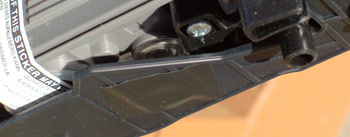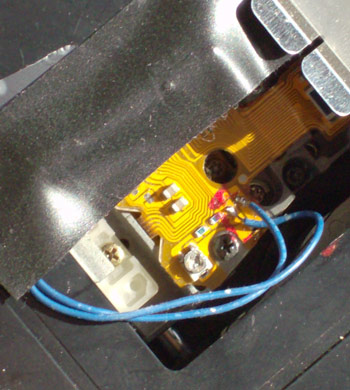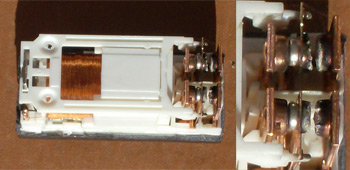When electronics think they’re smarter than you
April 9, 2010
Archive
Archive
Today’s electronic devices have a lot of features, automation, and indicators that are supposed to make things easier. Although most of these things may be well-intended, there are times when I find myself wondering if they weren’t actually designed to fail or make you buy more stuff. “Planned obsolescence” is the term for it. Bottom line: it’s hard to find things built to last that aren’t found in a military surplus store.
Generally, if you think something is amiss or “fishy,” take a look at it or research the problem. You might be surprised what you find. Rather than give a general description, I’ll give some examples in order to provoke more thought.
 I like my Brother laser printer. It works great and is always ready when I need it. But, one day, it decided I needed to clean the corona wire because it was “out of toner.” I knew that was not true and found a great page discussing this problem at fixyourownprinter.com Ever since I’ve fooled the sensor, I’ve printed at least 300 sheets and am still using the original toner cartridge!
I like my Brother laser printer. It works great and is always ready when I need it. But, one day, it decided I needed to clean the corona wire because it was “out of toner.” I knew that was not true and found a great page discussing this problem at fixyourownprinter.com Ever since I’ve fooled the sensor, I’ve printed at least 300 sheets and am still using the original toner cartridge!
Looking up the error code for the printer, we found Epson suggesting the printer be sent in for repair. … Who would do that since printers are so inexpensive? So, we bought another printer and made the mistake of buying another Epson. Can you guess what happened about two years later? … “Fatal error” with no prior indication of a problem. … Foul play (“Planned obsolescence”)?
 I’m sure most people are familiar with the dreaded “disc read error” in many game consoles. Luckily there are many guides out there to fix various game console problems. This is how I acquired my Playstation 2 free, it had this problem. After correcting the problem (a few times), it has worked well for every game I’ve played on it.
I’m sure most people are familiar with the dreaded “disc read error” in many game consoles. Luckily there are many guides out there to fix various game console problems. This is how I acquired my Playstation 2 free, it had this problem. After correcting the problem (a few times), it has worked well for every game I’ve played on it.
As I addressed this issue, the thing that confounded me was that the variable resistors that controlled the laser voltage were on the laser head unit itself. As you probably know, the head unit moves around quite a bit, and there was no glue on the resistors to keep them from changing their value.
Trying to follow the circuit layout, it seems like the conductors connecting the resistors don’t even connect directly to anything on the laser head unit! It makes me wonder whether the engineers intentionally choose to put those resistors where things could purposely go wrong, or were they just ignorant.
 You can read about my experience with a 400VA APC UPS under the last subhead “Using a Store-bought UPS” in my article about Building a UPS. As it turns out, I recently discovered the point of failure was the cheap relay they used to transfer power. Of course, the unnecessary wear on the relay could have been prevented had the “smart circuits” not wanted to test it every time I turned it on. … If I want to test it, I’ll just unplug it while everything is running.
You can read about my experience with a 400VA APC UPS under the last subhead “Using a Store-bought UPS” in my article about Building a UPS. As it turns out, I recently discovered the point of failure was the cheap relay they used to transfer power. Of course, the unnecessary wear on the relay could have been prevented had the “smart circuits” not wanted to test it every time I turned it on. … If I want to test it, I’ll just unplug it while everything is running.
In my situation with car sensors, the “air bag” light came on after I had accidentally ran into a tree. … Shouldn’t that light have been on before hitting something? After the oil was changed, the “service engine soon” light stays on for no good reason. The “anti-lock break system” light also stays on, but I suppose I can understand that after hitting a tree. … But why do the blinker lights on the instrument panel stay lit when I turn on my headlights?
Beware of Flaky Sensors and Indicators
There are a lot more sensors incorporated into electronic devices than there used to be. Unfortunately, while some sensors serve a good purpose, many give misleading information. In a some ways, it’s reminiscent of the classic boy who cried wolf.Generally, if you think something is amiss or “fishy,” take a look at it or research the problem. You might be surprised what you find. Rather than give a general description, I’ll give some examples in order to provoke more thought.
My experience with a Brother laser printer
 I like my Brother laser printer. It works great and is always ready when I need it. But, one day, it decided I needed to clean the corona wire because it was “out of toner.” I knew that was not true and found a great page discussing this problem at fixyourownprinter.com Ever since I’ve fooled the sensor, I’ve printed at least 300 sheets and am still using the original toner cartridge!
I like my Brother laser printer. It works great and is always ready when I need it. But, one day, it decided I needed to clean the corona wire because it was “out of toner.” I knew that was not true and found a great page discussing this problem at fixyourownprinter.com Ever since I’ve fooled the sensor, I’ve printed at least 300 sheets and am still using the original toner cartridge!Bad experience with Epson ink-jet printers
My family has also had problems with suicidal Epson ink-jet printers. Our first printer was an Epson, and it worked great for about two years. One day, while it was printing, after it finished printing a nice page without any problems earlier, it gave a “fatal error” code that couldn’t be done away with or reset.Looking up the error code for the printer, we found Epson suggesting the printer be sent in for repair. … Who would do that since printers are so inexpensive? So, we bought another printer and made the mistake of buying another Epson. Can you guess what happened about two years later? … “Fatal error” with no prior indication of a problem. … Foul play (“Planned obsolescence”)?
My experience with the Sony Playstation 2
 I’m sure most people are familiar with the dreaded “disc read error” in many game consoles. Luckily there are many guides out there to fix various game console problems. This is how I acquired my Playstation 2 free, it had this problem. After correcting the problem (a few times), it has worked well for every game I’ve played on it.
I’m sure most people are familiar with the dreaded “disc read error” in many game consoles. Luckily there are many guides out there to fix various game console problems. This is how I acquired my Playstation 2 free, it had this problem. After correcting the problem (a few times), it has worked well for every game I’ve played on it.As I addressed this issue, the thing that confounded me was that the variable resistors that controlled the laser voltage were on the laser head unit itself. As you probably know, the head unit moves around quite a bit, and there was no glue on the resistors to keep them from changing their value.
Trying to follow the circuit layout, it seems like the conductors connecting the resistors don’t even connect directly to anything on the laser head unit! It makes me wonder whether the engineers intentionally choose to put those resistors where things could purposely go wrong, or were they just ignorant.
My experience with an APC UPS
 You can read about my experience with a 400VA APC UPS under the last subhead “Using a Store-bought UPS” in my article about Building a UPS. As it turns out, I recently discovered the point of failure was the cheap relay they used to transfer power. Of course, the unnecessary wear on the relay could have been prevented had the “smart circuits” not wanted to test it every time I turned it on. … If I want to test it, I’ll just unplug it while everything is running.
You can read about my experience with a 400VA APC UPS under the last subhead “Using a Store-bought UPS” in my article about Building a UPS. As it turns out, I recently discovered the point of failure was the cheap relay they used to transfer power. Of course, the unnecessary wear on the relay could have been prevented had the “smart circuits” not wanted to test it every time I turned it on. … If I want to test it, I’ll just unplug it while everything is running.My family’s experience with …
My dad, Lester Humphreys, is an electrical engineer. So it goes without saying that he is the reason I’ve learned so much about electronics. It’s also no surprise how many things we find questionable in terms of design. Most of the time it’s parts made of plastic that should respectably be made of metal.Troubled by “automatic” toilet flushers, sinks, and soap/towel dispensers
There’s not a lot to say here that you probably don’t already know. You’ve probably seen or experienced:- continuously flushing toilets
- the sinks that never work when they should or are always running
- “hands free”dispensers that you practically have to touch
- dispensers that give you as little as possible
- dispensers with dead batteries
Being pestered by car sensors
I’m sure many people have probably had this experience. It seems the newer the car, the more often it’s car horn alarm goes off when it shouldn’t. In my dad’s situation, it’s an occasional “change oil soon” light that can’t comprehend that he uses a longer lasting synthetic motor oil. Additionally, the “fasten seat belt” light comes on when you put a port folio bag in the passenger seat. The seat belt light also intermittently comes on when someone is actually in the seat with the seat belt fastened.In my situation with car sensors, the “air bag” light came on after I had accidentally ran into a tree. … Shouldn’t that light have been on before hitting something? After the oil was changed, the “service engine soon” light stays on for no good reason. The “anti-lock break system” light also stays on, but I suppose I can understand that after hitting a tree. … But why do the blinker lights on the instrument panel stay lit when I turn on my headlights?






